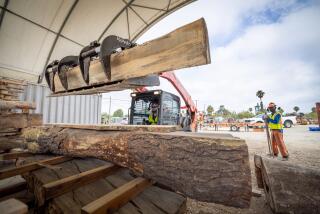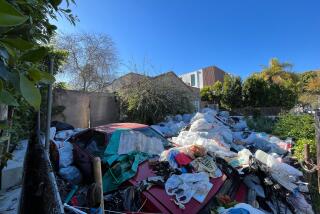STANTON : Mulch Ado About Recycling
- Share via
An entrepreneur who recycled tree limbs, shrubs and brush has run afoul of the city, with neighbors complaining that his project is transforming their street into a dump.
The city won a preliminary injunction last week against Barry Meijer Jr. to keep him from operating his recycling facility on Monroe Street in an industrial section of Stanton.
Meijer took in shrub clippings, tree branches and other plant waste and ground it to produce wood chips and mulch.
The soft mulch was sold to gardeners and the wood chips were sold as fuel for a power plant in Thermal.
“This is a new business. It’s ecologically sound. It’s earth to earth,” said Jim Zender, who works for Meijer. About 3,000 tons of green waste was recycled each month and diverted from landfills, Meijer said.
But according to the city attorneys and a neighboring auto repairman, the grinding created dust thick with pine sap that settled on cars and trucks in the neighborhood. It was expensive to remove, according to Tom Rumisek, who runs Auto Works, which is across the street from Meijer’s mulching plant.
And there was a stench from the huge piles of greenery at 8270 Monroe St.
“Breathing is just impossible sometimes,” Rumisek said. “The stink was just so bad we couldn’t handle it.” Rumisek said some of his workers called in sick, and others wore respirators to work. In a declaration that was used in the city lawsuit, Rumisek said he had seen rats and bugs crawling from the piles of green waste.
“We believed there were serious health hazards,” said Tony Condotti, an attorney for the city. The city sued Meijer earlier this month for operating without a business license, having “rubbish” on the site, obstructing the street, and creating a stench.
Meijer said the city refused to give him a business license. The mulching began in March, Meijer said, and he and his partners cleaned up the site before moving in.
“There is an odor,” Meijer said. “An odor of green material.”
Rumisek contended in legal documents that the mulch piles might produce methane gas, which are highly flammable. Meijer denied the existence of methane gas.
The mulch piles are now gone. Meijer said he will fight the city, and also look for a more sympathetic city in which to do business.
“I think recycling is extremely important,” Meijer said. “I feel that whatever problems there are can be dealt with.”
Condotti said the city will continue its case against Meijer. “I’m concerned about making sure they don’t go back and continue their operation without obtaining proper permits,” he said.
“I think it’s good what they’re doing,” said Rumisek. “But this isn’t the right place.”






